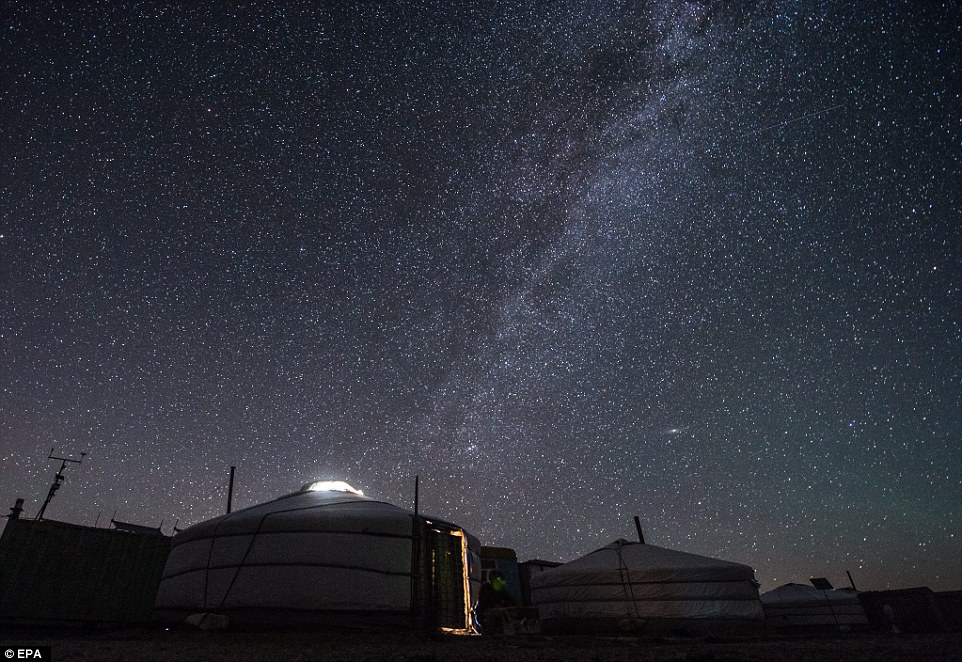The wild horses of Mongolia: Stunning photographs show glorious return of Przewalski's mares in an effort to save the species
- Four horses have been brought back to their native steppes in Mongolia's Takhin Tal Nature Reserve
- The Return of Wild Horses project is a collaboration between the Prague Zoo and the Czech Army
- The rare breeds are brought from Prague to Bulgan in a 24-hour journey requiring two stopovers for re-fuelling
In a complex and highly delicate operation, carried out with military precision, four wild Przewalski’s horses have been returned to their native steppes, the Gobi desert region of southern Mongolia.
The Return of Wild Horses project was first launched in 2011 and this month, in a collaboration between Prague Zoo and the Czech Army, a fourth group of the rare breed was prepared for the arduous journey from the Kbely military air transportation base in Prague to Bulgan.
The 24-hour journey required two stopovers for re-fuelling, with the horses, named after a Russian explorer and naturalist during an expedition, being moved from Prague Zoo to an acclimatisation centre, Dolni Dobrejov, some 50 miles from the capital.
Scroll down for video

Four wild Przewalski’s horses have been returned to their native steppes, the Gobi desert region of southern Mongolia

The Return of Wild Horses project ultimately leads the animals to the ancestral Gobi desert region of southern Mongolia

A herd of Przewalski's horses run in the Takhin Tal Nature Reserve, part of the Gobi B Strictly Protected Area
All four mares were born in different cities: Kira in Hungary’s National Park in August 2008, Rabea in Leipzig in September 2009, Paradise in Paris in May 2009, and Querida in Prague Zoo in August 2012.
It was the role of head vet Roman Vodicka to administer the tranquilisers during this acclimatisation process and he had to use a double dosage of sedative on Querida who had sleeping difficulties.
Before being installed in their respective transport crates, the horses had blood samples taken by the vets.

The Return of Wild Horses project was first launched in 2011 in a collaboration between Prague Zoo and the Czech Army

This year, a fourth group of the rare breed was prepared for the journey from the Kbely military air transportation base in Prague to Bulgan

A vehicle of the convoy drives by a lorry transporting crates that contain Przewalski's horses en route from Bulgan
With soaring temperatures across Europe, it was important to avoid intense sun exposure. The military aircraft transporting the horses was kept inside a hangar.
During the long journey, the crew on board tried to maintain a comfortable temperature inside the plane while the vets attempted to keep the equine charges calm.
Upon landing on the difficult grass runway of Bulgan airport, the crates were loaded onto lorries for the next stage of the seven hour torturous trip to the Takhin Tal Nature Reserve in the Gobi B Strictly Protected Area during which one of the prize Przewalski’s horses collapsed but was stabilised with medication.

Horse Querida, born in Prague Zoo in 2012, jumped out of her transport crate upon arrival at the nature reserve

A convoy transporting the crates containing the horses took a 24-hour arduous journey to bring the animals home

A lorry of the convoy transporting the crates that contain the horses passes by a yurt while driving from Bulgan

Villagers look on in interest as the convoy journeys from Bulgan to Takhin Tal Nature Reserve

Children play on a statue of a Przewalski's horse at the Takhin Tal Nature Reserve, the ancestral lands of the animal

To celebrate the successful arrival of Przewalski's horses, Mongolian rangers and family members celebrate during a dinner

Przewalski's horse Rabea, born in Leipzig, Germany in 2009, drinks water from inside her transport craft during the journey from Bulgan

Here, several Przewalski's horses stand in an acclimation pen of the Takhin Tal Nature Reserve

All four mares will stay in their paddock for one year as part of their preparation for the return to the wild. Pictured: a ranger at the Reserve

Arriving in the middle of the night, the horses were let out into an acclimatisation pen and the Prague Zoo team finally could take a rest
Arriving at the reserve in the middle of the night, the horses were let out into an acclimatisation pen and the Prague Zoo team finally could take a rest.
This fourth adventurous horse transportation operation was once again a success.
All four mares will stay in their paddock for one year as part of their preparation for the return to the wild, eventually helping to expand the heads of the last surviving wild horses in the world.































 The Prince of Monaco's daughter Jazmin Grace Grimaldi lifts the lid on royal life, bonding with her father and her 'connection' with Grace Kelly in her first ever interview
The Prince of Monaco's daughter Jazmin Grace Grimaldi lifts the lid on royal life, bonding with her father and her 'connection' with Grace Kelly in her first ever interview
Great project and a great story...would love to see...
by Heresathought 161